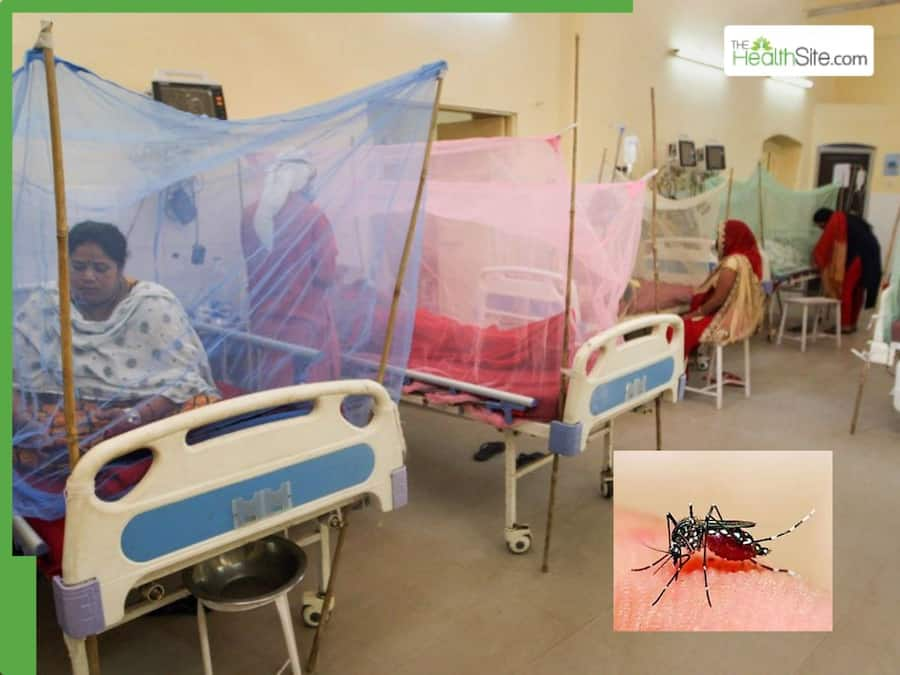Dengue cases are rising in Noida and Ghaziabad with over 400 reported infections. Health officials have fixed dengue test prices at 600, deployed 265 rapid response teams, and started fogging drives to control mosquito breeding. Stay updated on symptoms, prevention, and government measures.

Dengue cases are resurfacing in certain areas of Uttar Pradesh, and Noida and Ghaziabad have seen a dramatic rise in cases over the last few weeks. The viral infection, which is transmitted by the bite of the Aedes aegypti mosquito, is known as the mosquito-borne viral infection and usually peaks around the monsoon and post-monsoon months. However, this year, the abrupt rise in figures has become an issue of concern to not only the health authorities but the residents as well.
Dengue Situation in Noida and Ghaziabad
Health officials witnessed over 312 reported cases of dengue in Noida alone this year, and over 130 of the cases had been identified within the past two weeks. A total of 108 cases is registered in the neighbouring Ghaziabad. This outbreak is an indicator of the rate at which the infection is spreading, particularly during the season when stagnant water is the breeding habitat of the mosquito.
Dengue Test Prices Fixed to Prevent Overcharging
To ensure timely detection and affordable testing, the cost of a dengue test has been fixed at 600. This guideline has been enforced by the health officials to be carefully adhered to in the private hospitals and diagnostic centres. Moreover, the private hospitals have been instructed to give priority to the medical attention of the patients afflicted by the diseases caused by vector-borne diseases like dengue and malaria.
Dengue: 265 Rapid Response Teams Deployed
Health officials have cordoned off 265 rapid response teams so as to manage the spread and offer immediate support. These teams are operating within the areas of effect:
- Provide care to patients and promote fast treatment.
- Pay door-to-door visits to observe breeding places of mosquitoes.
- Educate about prevention measures among the residents.
Why Are Cases Rising Suddenly?
The significant rise in the number of dengue patients is conditioned by several factors:
- Weather Conditions – Frequent rains followed by humidity create the perfect environment for mosquito breeding. A collection of water as small as that contained in pots, drains, or coolers, or those found discarded, can become a breeding area.
- Urban Lifestyle and Construction – Urban sprawl and heavy growth of cities and towns such as Noida and Ghaziabad, subject the environment to poor waste management practices. Open water tanks and neglected construction sites contain rainwater; thus, it is easy to find larvae of dengue-carrying mosquitoes proliferating.
- Delayed Preventive Measures – Fogging and larvicide spraying are done; however, in most cases, they are increased once cases start to grow as opposed to preventive measures being put into place before outbreaks. Such a lag accounts for the unexpected spike.
- Lack of Awareness – Although they frequently hold camps, a large number of inhabitants are not aware of the fact that dengue is easily infectious. Such easy steps as enveloping water containers or using mosquito repellents may be overlooked.
Preventive Measures in Action
Besides medical surveillance, the authorities have also taken steps of preventive methods, such as:
- Fogging of residential colonies, parks and construction sites.
- Drains for larvicidal spraying in areas with waterlogging problems.
- Education to make people consider keeping the place around them clean, preventing water stagnation, and using mosquito nets or repellents.
Key Highlights
-
Dengue cases surge in Noida (312) and Ghaziabad (108) this season.
-
Dengue test price capped at Rs 600 to prevent overcharging.
-
265 rapid response teams deployed for immediate action.
-
Authorities launch fogging and larvicidal spraying drives.
-
Residents are urged to prevent mosquito breeding and seek early treatment.
What Can Residents Do?
Although there is a lot the government and health teams can do, they should also take precautions to safeguard the residents and their families. These are weak, but some efficient measures are:
- Never allow water to stagnate in flowerbeds, cans or coolers.
- Take regular water in containers and overhead tanks.
- Extra coverage: to keep off any mosquito bites, wear full-sleeved clothes.
- Apply mosquito repellents, nets and screens within the homes.
- The victim should also seek medical assistance upon the occurrence of symptoms like high fever, headache, pain in the joints, or rashes.
However, the only way to prevent this in the long run is by making sure that the population is informed and has the collective duty to make sure their environment is clean and mosquito-free.
FAQs
How can residents prevent dengue at home?
Avoid water stagnation, use mosquito repellents, wear full sleeves, and keep surroundings clean.
Why are dengue cases rising suddenly this year?
Frequent rains, water stagnation, poor waste management, and delayed preventive measures are key reasons.
How many rapid response teams have been deployed?
A total of 265 rapid response teams are working to control the dengue spread.
What is the fixed cost of a dengue test in Noida and Ghaziabad?
The dengue test price has been capped at Rs 600 by health authorities.






